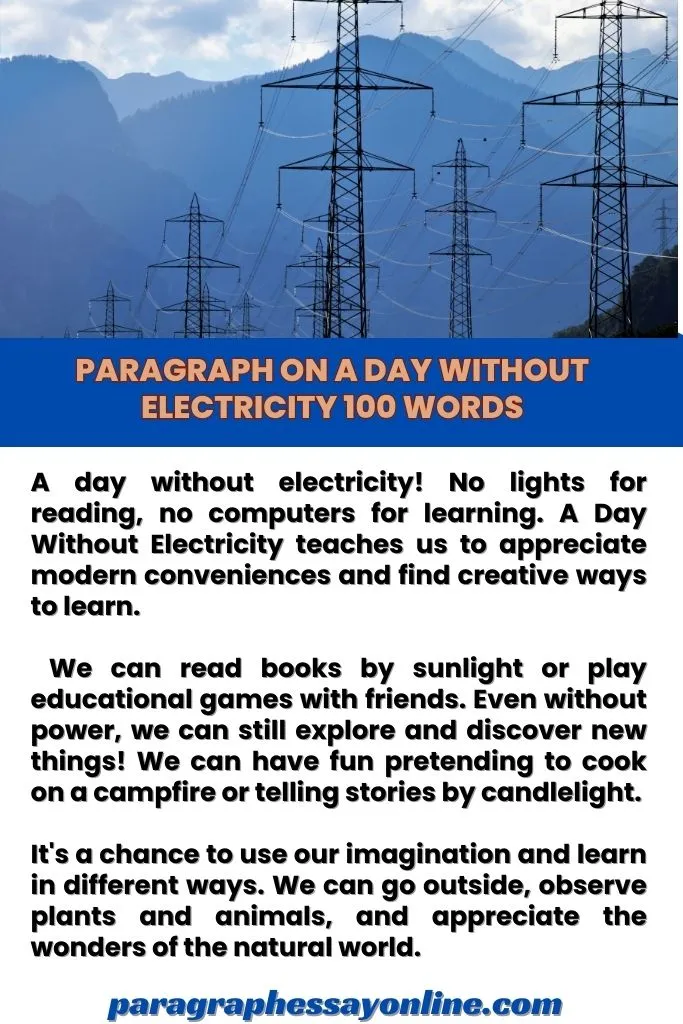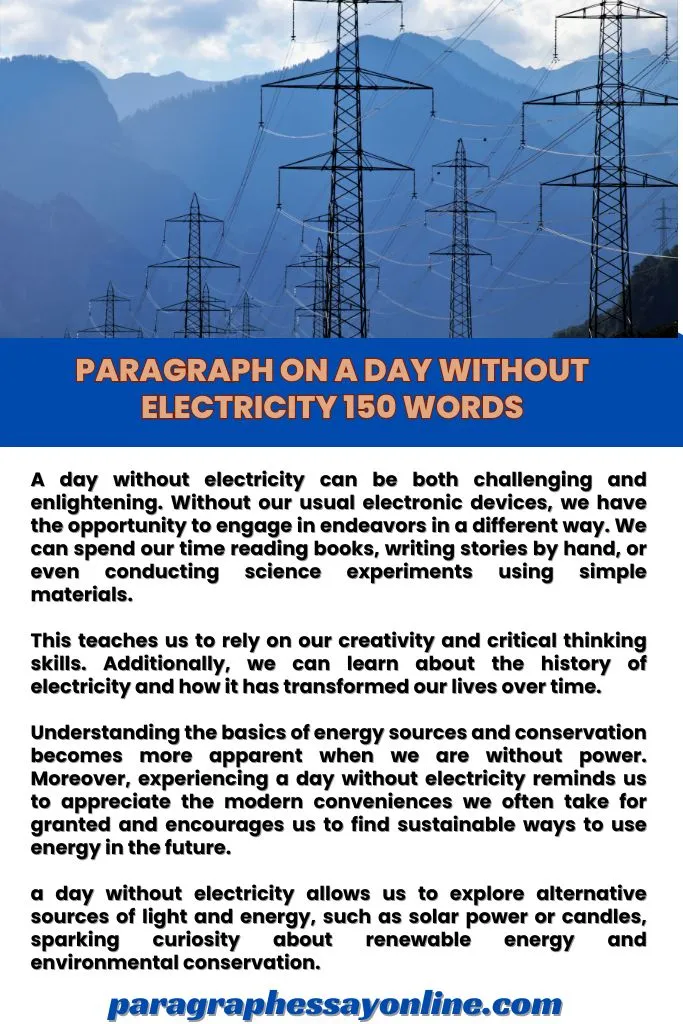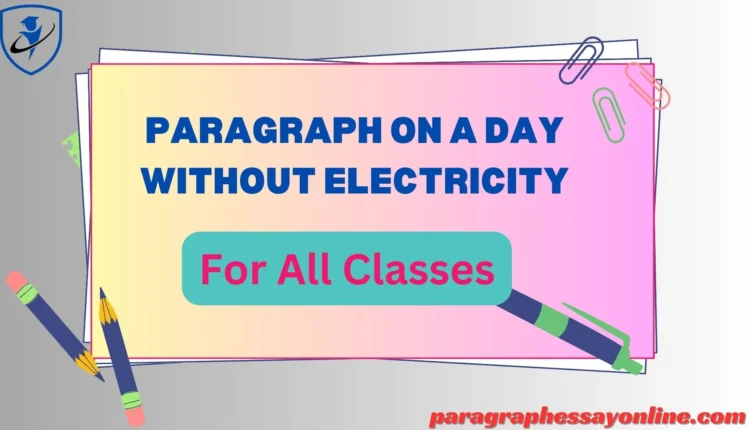Paragraph On A Day Without Electricity
Paragraph On A Day Without Electricity Long and Short (100- 500 words)
A day without electricity: no lights, no gadgets, and no power. A Day Without Electricity explores the challenges and insights of living off the grid, shedding light on the importance of energy in our daily lives and the innovations that shape our modern world.
Paragraph On A Day Without Electricity 100 Words For 1, 2, 3 Students
A day without electricity! No lights for reading, no computers for learning. A Day Without Electricity teaches us to appreciate modern conveniences and find creative ways to learn. We can read books by the sunlight or play educational games with friends. Even without power, we can still explore and discover new things! We can have fun pretending to cook on a campfire or telling stories by candlelight.
It’s a chance to use our imagination and learn in different ways. We can go outside, observe plants and animals, and appreciate the wonders of the natural world.

A Day Without Electricity Paragraph 150 Words For 4 And 5 Students
A day without electricity can be both challenging and enlightening. Without our usual electronic devices, we have the opportunity to engage in endeavors in a different way. We can spend our time reading books, writing stories by hand, or even conducting science experiments using simple materials. This teaches us to rely on our creativity and critical thinking skills. Additionally, we can learn about the history of electricity and how it has transformed our lives over time.
Understanding the basics of energy sources and conservation becomes more apparent when we are without power. Moreover, experiencing a day without electricity reminds us to appreciate the modern conveniences we often take for granted and encourages us to find sustainable ways to use energy in the future. a day without electricity allows us to explore alternative sources of light and energy, such as solar power or candles, sparking curiosity about renewable energy and environmental conservation.

Paragraph On A Day Without Electricity 200 Words For 6, 7, 8 Students
Experiencing a day without electricity offers a unique opportunity for exploration and learning. Without the usual electronic distractions, we can delve into alternative activities that stimulate our minds and creativity. For instance, we can engage in reading physical books, writing essays or stories by hand, or practicing mathematical problems without the aid of calculators. This encourages critical thinking and problem-solving skills. Additionally, we can conduct science experiments using simple materials, gaining hands-on experience and deepening our understanding of scientific concepts.
Furthermore, a day without electricity provides insight into the history and impact of electricity on society. We can research and learn about the pioneers of electricity, such as Thomas Edison and Nikola Tesla, and how their inventions revolutionized the world. Understanding the basics of energy sources and conservation becomes more apparent when we are without power, prompting discussions about sustainable energy solutions.
Moreover, experiencing a day without electricity fosters appreciation for modern conveniences and encourages us to find ways to use energy more efficiently. It also sparks curiosity about alternative energy sources like solar power and wind energy, motivating us to explore the possibilities of renewable energy for a sustainable future. Thus, a day without electricity serves as a valuable experience that perspectives on energy, technology, and society.
A Day Without Electricity Paragraph 250 Words For 8,9,10 Students
A day without electricity offers a unique opportunity to explore endeavors beyond the confines of technology. In the absence of electronic devices, we can delve into activities that stimulate our intellectual curiosity and foster critical thinking skills. For instance, we can immerse ourselves in reading physical books, which not only enhances our comprehension but also encourages a deeper appreciation for literature. Writing essays or stories by hand allows us to refine our writing skills and express our thoughts creatively, without the aid of word processors. Moreover, engaging in mathematical problems without calculators challenges our problem-solving abilities and strengthens our numerical reasoning.
Furthermore, a day without electricity provides insight into the historical significance and societal impact of electricity. Researching the pioneers of electricity, enables us to understand the technological advancements that have shaped our modern world. Exploring the basics of energy sources and conservation prompts discussions about sustainable practices and environmental stewardship. Understanding the fragility of our dependence on electricity encourages us to consider alternative energy sources, such as solar and wind power, for a more sustainable future.
Additionally, experiencing a day without electricity fosters resourcefulness and resilience. Finding creative solutions to everyday tasks, such as cooking meals without electric appliances or finding alternative sources of light, cultivates adaptability and problem-solving skills. It also encourages us to appreciate the conveniences of modern life while recognizing the importance of conserving energy and minimizing our ecological footprint. Thus, a day without electricity serves as a valuable educational experience that broadens our perspectives and deepens our understanding of the interplay.
Paragraph On A Day Without Electricity 300 Words For 9, 10, 11, 12 Students
A day without electricity offers a profound opportunity for exploration and reflection. In the absence of modern conveniences, we are compelled to engage in activities that stimulate our intellect and foster critical thinking skills. Reading physical books becomes a primary source of knowledge, allowing us to immerse ourselves in literature and history without the distractions of screens.
Writing essays or stories by hand encourages creativity and develops our writing prowess, honing our ability to communicate effectively. Additionally, solving mathematical problems without the aid of calculators challenges our mathematical reasoning and problem-solving abilities, reinforcing fundamental concepts.
Moreover, a day without electricity provides insights into the historical significance and societal impact of electricity. Researching the pioneers of electricity, such as Thomas Edison and Nikola Tesla, deepens our understanding of technological advancements and their implications for society.
Exploring alternative energy sources, such as solar and wind power, prompts discussions about sustainable energy solutions and environmental conservation. Understanding the fragility of our dependence on electricity fosters a sense of environmental stewardship and motivates us to advocate for renewable energy initiatives.
Furthermore, experiencing a day without electricity cultivates resourcefulness and resilience. Finding creative solutions to everyday tasks, such as cooking meals without electric appliances or relying on natural light for illumination, enhances our adaptability and problem-solving skills. It also fosters appreciation for the conveniences of modern life while instilling a sense of gratitude and mindfulness. Reflecting on the experience, we gain a deeper appreciation for the interconnectedness of technology, society, and the environment, and recognize the importance of balancing progress with sustainability.
A day without electricity serves as a valuable educational experience that broadens our perspectives, deepens our understanding of fundamental concepts, and fosters a sense of responsibility towards our environment and society. It reminds us of the power of human ingenuity and resilience in overcoming challenges and inspires us to embrace sustainable.
Paragraph On A Day Without Electricity 500 Words For All Students
Experiencing a day without electricity provides a unique opportunity for exploration and personal growth. In the absence of modern technology, we are compelled to engage in activities that stimulate our intellect and foster critical thinking skills. For instance, reading physical books becomes a primary source of knowledge, allowing us to immerse ourselves in literature and history without the distractions of screens.
Writing essays or stories by hand encourages creativity and develops our writing prowess, honing our ability to communicate effectively. Additionally, solving mathematical problems without the aid of calculators challenges our mathematical reasoning and problem-solving abilities, reinforcing fundamental concepts.
Moreover, a day without electricity offers insights into the historical significance and societal impact of electricity. Researching the pioneers of electricity, such as Thomas Edison and Nikola Tesla, deepens our understanding of technological advancements and their implications for society. Exploring alternative energy sources, such as solar and wind power, prompts discussions about sustainable energy solutions and environmental conservation. Understanding the fragility of our dependence on electricity fosters a sense of environmental stewardship and motivates us to advocate for renewable energy initiatives.
Furthermore, experiencing a day without electricity cultivates resourcefulness and resilience. Finding creative solutions to everyday tasks, such as cooking meals without electric appliances or relying on natural light for illumination, enhances our adaptability and problem-solving skills. It also fosters appreciation for the conveniences of modern life while instilling a sense of gratitude and mindfulness. Reflecting on the experience, we gain a deeper appreciation for the interconnectedness of technology, society, and the environment, and recognize the importance of balancing progress with sustainability.
A day without electricity serves as a valuable educational experience that broadens our perspectives, deepens our understanding of fundamental concepts, and fosters a sense of responsibility towards our environment and society. It reminds us of the power of human ingenuity and resilience in overcoming challenges and inspires us to embrace sustainable practices for a brighter future.
Additionally, a day without electricity offers us the opportunity to explore traditional methods of communication and entertainment. We can engage in meaningful conversations with family and friends without the distraction of electronic devices, fostering interpersonal connections and communication skills. Furthermore, we can rediscover simple pleasures such as board games, puzzles, or outdoor activities, which not only provide entertainment but also stimulate cognitive development and creativity.
Moreover, experiencing a day without electricity prompts us to consider the broader implications of energy consumption and its impact on the environment. We may reflect on our own energy usage habits and explore ways to reduce our carbon footprint, such as using energy-efficient appliances or practicing energy conservation measures. This awareness empowers us to make informed choices and advocate for sustainable energy policies in our communities and beyond.
Furthermore, a day without electricity can serve as a catalyst for innovation and problem-solving. As we encounter challenges and obstacles, we are encouraged to think outside the box and devise creative solutions using the resources available to us. This fosters resilience and adaptability, essential qualities for navigating the complexities of the modern world.
In conclusion, experiencing a day without electricity offers a wealth of opportunities for, personal, and societal growth. By embracing the challenges and opportunities presented by this experience, we can deepen our understanding of ourselves, our communities, and the world around us. Let us approach each day with curiosity, resilience, and a commitment to making a positive impact on the world.
Most Important Paragraph:
| Paragraph On Digital India. |
| Rainy Season Paragraph. |
| Paragraph About Renewable Energy. |
| Cyber Crime Paragraph. |
| My Favourite Hero Paragraph. |
Frequently Asked Questions For Paragraph On A Day Without Electricity
Q: What would a day without electricity be like?
Answer: A day without electricity would mean no lights, no electronic devices, and no appliances that rely on power to function. It would require us to find alternative ways to accomplish daily tasks and entertain ourselves.
Q: How can I prepare for a day without electricity?
Answer: To prepare for a day without electricity, you can gather essential supplies such as flashlights, candles, non-perishable food items, and board games or books for entertainment. It’s also helpful to have a plan in place for staying connected with family and friends.
Q: What are some activities to do during a day without electricity?
Answer: During a day without electricity, you can engage in activities such as reading books, playing board games, going for a nature walk, cooking meals using alternative methods, or simply spending quality time with loved ones.
Q: Why is it important to experience a day without electricity?
Answer: Experiencing a day without electricity helps us appreciate the conveniences of modern life and become more aware of our energy consumption habits. It also fosters resilience and creativity as we find alternative ways to accomplish tasks.
Q: How can I make the most of a day without electricity?
Answer: To make the most of a day without electricity, you can use the time to engage in activities that don’t require power, such as reading, writing, spending time outdoors, or learning a new skill. It’s also an opportunity to reflect on the importance of energy conservation and sustainability.
